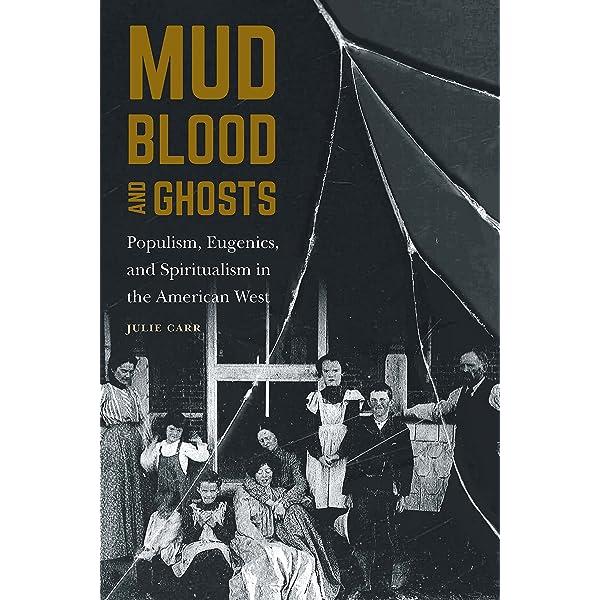Book Review: Mud, Blood, and Ghosts: Populism, Eugenics, and Spiritualism in the American West

book cover photo from University of Nebraska Press
How responsible are we for the supremacist legacies left behind by our ancestors?
Julie Carr’s Mud, Blood, and Ghosts: Populism, Eugenics, and Spiritualism in the American West (University of Nebraska Press, 2023) is a meticulous exploration of her family’s history of complicity with eugenics and her own mission to combat this legacy. Carr, the author of eleven books of poetry and prose, uses an interdisciplinary storytelling approach to provide readers with a multidimensional understanding of eugenic violence and its impact on historically violated communities in the American West.
Mining a rich trove of archival resources, she exposes the sinister ideologies and mechanisms that empowered the U.S. establishment to dominate and marginalize those they classified as "other." To make sense of the complexities of her family history, she asks: What pieces of that history of violence do I carry? What forms of resistance do I also inherit? How can I learn from both? (11). Her questions challenge not just herself, but all readers, beckoning them to introspect, understand, and act, emphasizing the critical role of collective memory in shaping a liberated world – an experience and right for folks from all walks of life and histories.
Carr constructs a compelling family narrative that revolves around the life of her great-grandfather, Omer Madison Kem (1855-1942), a radical Populist homesteader and Congressional representative from Nebraska during the 1890s. The late nineteenth and early twentieth centuries were marked by aggressive westward expansion, territorial negotiations, and the brutal displacement of Indigenous communities. Kem, seeking to bolster his political standing and preserve the privileges of his whiteness, waded into this complex terrain as a member of the House Committee on Indian Affairs.
Kem’s speeches and writing about Indigenous communities were inconsistent. But in a move that would leave an indelible mark on his legacy, he advocated for H.R. 67, an 1892 bill that endorsed the forceful removal of the Southern Ute tribes from their ancestral lands in Colorado to unfamiliar territories in Utah. As in so many other instances, the affected Indigenous communities were excluded from the political decisions behind their forced migrations. Carr contends, “Indians themselves, not being citizens and not being respected as members of independent nations, have little voice in this body of men, no representation or true negotiating power in the biopolitical regime that orders their lives” (71).
Carr’s book holds particular significance in the contemporary discourse permeating U.S. government and politics. She does not shy away from shining light on figures such as former president Donald Trump, whose supporters embraced his supremacist rhetoric on immigration, state-sanctioned violence, and unchallenged control of the U.S. political and social tapestry. The upcoming 2024 presidential election has spotlighted candidates who have dedicated their political labor to censorship in knowledge production and in women’s access to holistic healthcare, and to other divisive discourse.
Against this backdrop, the histories presented in Mud, Blood, and Ghosts emerge as vital tools. They serve as powerful educational instruments that can be harnessed to cultivate critical thinking, ethical consciousness, and a commitment to social justice among both undergraduate and graduate students in genetics, political science, history, and sociology.
Carr’s book goes beyond enriching disciplines historiographically, methodologically, and politically. Its commitment to social justice and the production of historical accounts free from settler-colonial fantasies is arguably one of its most salient impacts. One of its distinguishing hallmarks is its intentional spotlight on the stories of Black and Indigenous peoples, which unveils the deep-seated eugenic violence these communities have endured for generations.
This isn't just a recounting of historical oppression; it's a potent reminder of the lasting legacies of these injustices. Carr's emphasis on these narratives serves a dual purpose. On one hand, she seeks to educate readers, providing them with a richer, more nuanced understanding of the past. On the other, she aims to galvanize, urging readers to recognize the pressing need for reparative justice and systemic change.
What makes this book particularly compelling is Carr’s honest yet complicated experience with honoring her ancestors while holding them accountable for their diabolical actions towards communities that have been historically abused by those in power. Her endeavor is not merely a personal reckoning but a larger commentary on society's need to scrutinize its historical figures. Through Carr's introspective lens, the book challenges readers to confront the uncomfortable truth that individuals, even those we hold dear, can be both sources of inspiration and instruments of oppression. This duality, and Carr’s courageous engagement with it, renders her work deeply resonant and universally relevant. It is a call to action for all of us to consider challenging the eugenic business of power.
Gabriela Corona Valencia, a postdoctoral research associate at the University of Illinois Urbana-Champaign, is an education historian and a social science researcher in the areas of eugenics, sex education, and educational innovation in rural California.



